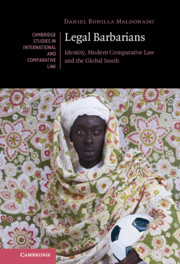Book contents
- Legal Barbarians
- Cambridge Studies in International and Comparative Law
- Legal Barbarians
- Copyright page
- Dedication
- Contents
- Acknowledgments
- The Legal Barbarians
- 1 The Legal Identity of the Global South
- 2 Comparative Instrumental Studies
- 3 Comparative Legislative Studies
- 4 Comparative Law as an Autonomous Discipline
- 5 The Critical Academic of Law
- Index
- Cambridge Studies in International and Comparative Law
5 - The Critical Academic of Law
Resistance and Emancipation
Published online by Cambridge University Press: 20 August 2021
- Legal Barbarians
- Cambridge Studies in International and Comparative Law
- Legal Barbarians
- Copyright page
- Dedication
- Contents
- Acknowledgments
- The Legal Barbarians
- 1 The Legal Identity of the Global South
- 2 Comparative Instrumental Studies
- 3 Comparative Legislative Studies
- 4 Comparative Law as an Autonomous Discipline
- 5 The Critical Academic of Law
- Index
- Cambridge Studies in International and Comparative Law
Summary
In the last chapter of the book, I examine the theoretical perspectives that question the narrative created by comparative modern law. Comparative law’s thought structures dominate an important part of the modern legal and political imagination. Nevertheless, these structures do not absolutely govern the way in which moderns give meaning to their experience. In its margins, there are theoretical perspectives that question them and try to articulate alternative normative horizons. Three of these perspectives are the Third World Approaches to International Law (TWAIL), the postcolonial studies of law, and critical comparative law. Each of these intellectual movements pursues distinct, precise objectives, such as the questioning of the imperial dimensions of international law, the critique of neocolonial legal relationships, or the questioning of the traditional methods and objectives of comparative law. Nevertheless, these movements share some elements that constitute this chapter's object of analysis. The aim of the chapter is thus not examining all dimensions, arguments, and authors that form each of these perspectives. What the chapter seeks is to describe and analyze how the three interact with the structures of thought of comparative law that form the basis of modern law. These intellectual movements describe these structures of thought as dominant, evaluate them negatively, and intend to replace them.
Keywords
- Type
- Chapter
- Information
- Legal BarbariansIdentity, Modern Comparative Law and the Global South, pp. 133 - 176Publisher: Cambridge University PressPrint publication year: 2021



